Managing Change Report: External Agent, Activities, and Diagnosis
VerifiedAdded on 2023/01/19
|12
|3071
|88
Report
AI Summary
This report examines the role of an external change agent in managing organizational change within a large organization. It begins by highlighting the advantages of an external change agent over an internal one, emphasizing objectivity and specialized expertise. The report then details five key activities that change agents must undertake: investigation, advocacy, encouragement, facilitation, and management. It identifies the stage of influencing and encouraging people as a difficult stage. The report concludes by outlining and discussing the crucial roles of diagnosis and feedback in organizational change, illustrating how these processes can be effectively implemented to improve performance and achieve desired outcomes. Examples are provided to support the arguments.

MANAGING CHANGE
Paraphrase This Document
Need a fresh take? Get an instant paraphrase of this document with our AI Paraphraser
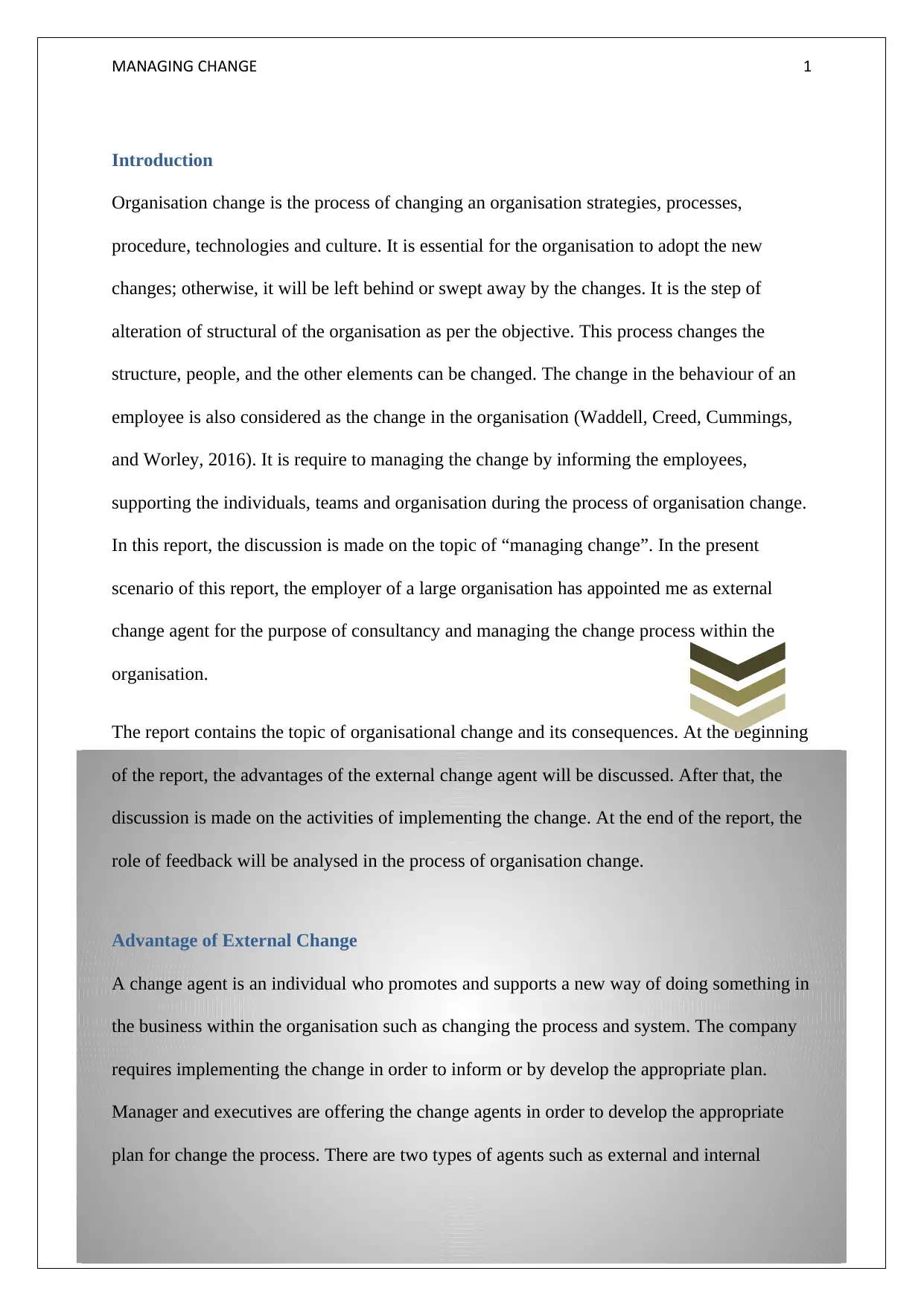
MANAGING CHANGE 1
Introduction
Organisation change is the process of changing an organisation strategies, processes,
procedure, technologies and culture. It is essential for the organisation to adopt the new
changes; otherwise, it will be left behind or swept away by the changes. It is the step of
alteration of structural of the organisation as per the objective. This process changes the
structure, people, and the other elements can be changed. The change in the behaviour of an
employee is also considered as the change in the organisation (Waddell, Creed, Cummings,
and Worley, 2016). It is require to managing the change by informing the employees,
supporting the individuals, teams and organisation during the process of organisation change.
In this report, the discussion is made on the topic of “managing change”. In the present
scenario of this report, the employer of a large organisation has appointed me as external
change agent for the purpose of consultancy and managing the change process within the
organisation.
The report contains the topic of organisational change and its consequences. At the beginning
of the report, the advantages of the external change agent will be discussed. After that, the
discussion is made on the activities of implementing the change. At the end of the report, the
role of feedback will be analysed in the process of organisation change.
Advantage of External Change
A change agent is an individual who promotes and supports a new way of doing something in
the business within the organisation such as changing the process and system. The company
requires implementing the change in order to inform or by develop the appropriate plan.
Manager and executives are offering the change agents in order to develop the appropriate
plan for change the process. There are two types of agents such as external and internal
Introduction
Organisation change is the process of changing an organisation strategies, processes,
procedure, technologies and culture. It is essential for the organisation to adopt the new
changes; otherwise, it will be left behind or swept away by the changes. It is the step of
alteration of structural of the organisation as per the objective. This process changes the
structure, people, and the other elements can be changed. The change in the behaviour of an
employee is also considered as the change in the organisation (Waddell, Creed, Cummings,
and Worley, 2016). It is require to managing the change by informing the employees,
supporting the individuals, teams and organisation during the process of organisation change.
In this report, the discussion is made on the topic of “managing change”. In the present
scenario of this report, the employer of a large organisation has appointed me as external
change agent for the purpose of consultancy and managing the change process within the
organisation.
The report contains the topic of organisational change and its consequences. At the beginning
of the report, the advantages of the external change agent will be discussed. After that, the
discussion is made on the activities of implementing the change. At the end of the report, the
role of feedback will be analysed in the process of organisation change.
Advantage of External Change
A change agent is an individual who promotes and supports a new way of doing something in
the business within the organisation such as changing the process and system. The company
requires implementing the change in order to inform or by develop the appropriate plan.
Manager and executives are offering the change agents in order to develop the appropriate
plan for change the process. There are two types of agents such as external and internal
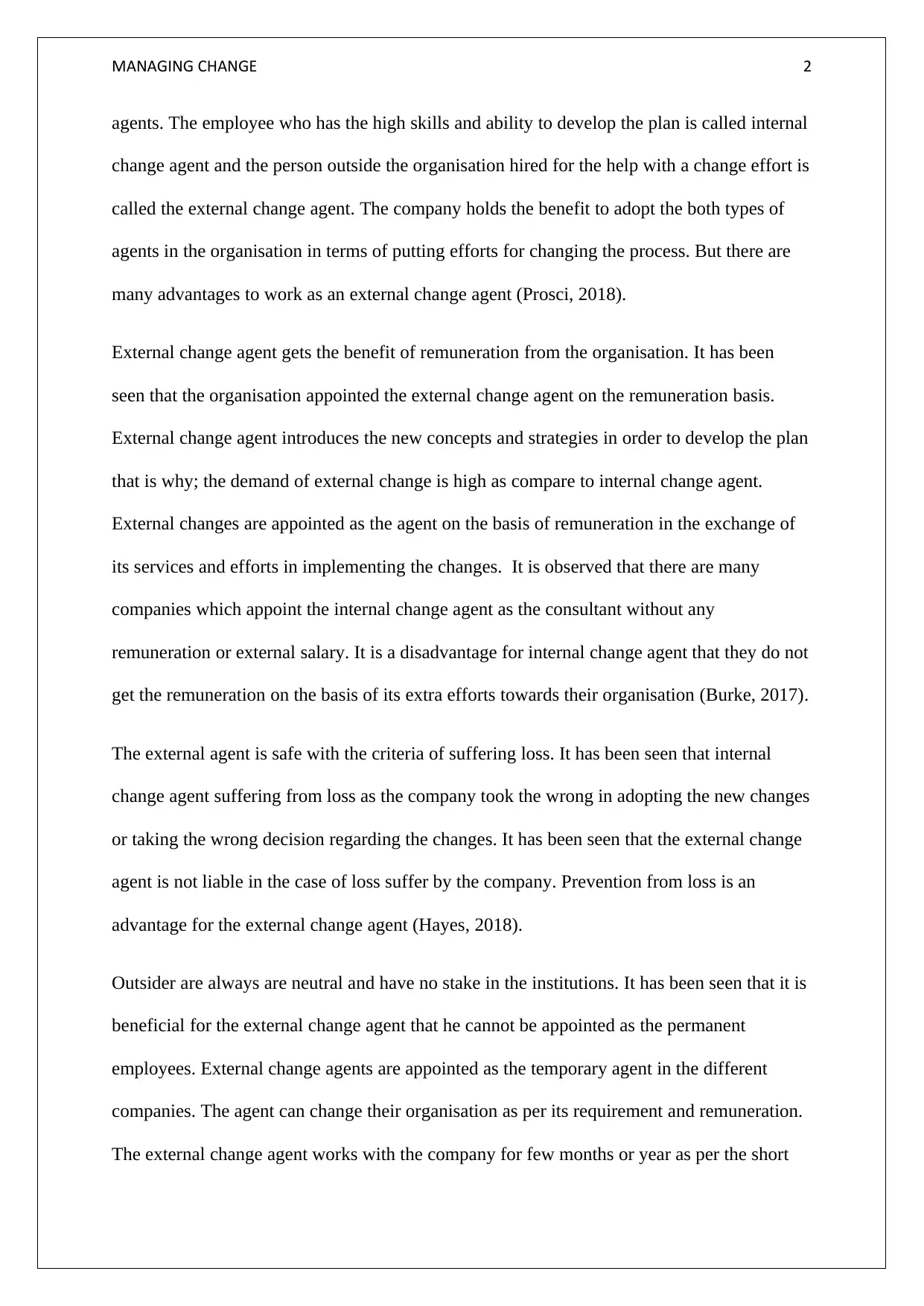
MANAGING CHANGE 2
agents. The employee who has the high skills and ability to develop the plan is called internal
change agent and the person outside the organisation hired for the help with a change effort is
called the external change agent. The company holds the benefit to adopt the both types of
agents in the organisation in terms of putting efforts for changing the process. But there are
many advantages to work as an external change agent (Prosci, 2018).
External change agent gets the benefit of remuneration from the organisation. It has been
seen that the organisation appointed the external change agent on the remuneration basis.
External change agent introduces the new concepts and strategies in order to develop the plan
that is why; the demand of external change is high as compare to internal change agent.
External changes are appointed as the agent on the basis of remuneration in the exchange of
its services and efforts in implementing the changes. It is observed that there are many
companies which appoint the internal change agent as the consultant without any
remuneration or external salary. It is a disadvantage for internal change agent that they do not
get the remuneration on the basis of its extra efforts towards their organisation (Burke, 2017).
The external agent is safe with the criteria of suffering loss. It has been seen that internal
change agent suffering from loss as the company took the wrong in adopting the new changes
or taking the wrong decision regarding the changes. It has been seen that the external change
agent is not liable in the case of loss suffer by the company. Prevention from loss is an
advantage for the external change agent (Hayes, 2018).
Outsider are always are neutral and have no stake in the institutions. It has been seen that it is
beneficial for the external change agent that he cannot be appointed as the permanent
employees. External change agents are appointed as the temporary agent in the different
companies. The agent can change their organisation as per its requirement and remuneration.
The external change agent works with the company for few months or year as per the short
agents. The employee who has the high skills and ability to develop the plan is called internal
change agent and the person outside the organisation hired for the help with a change effort is
called the external change agent. The company holds the benefit to adopt the both types of
agents in the organisation in terms of putting efforts for changing the process. But there are
many advantages to work as an external change agent (Prosci, 2018).
External change agent gets the benefit of remuneration from the organisation. It has been
seen that the organisation appointed the external change agent on the remuneration basis.
External change agent introduces the new concepts and strategies in order to develop the plan
that is why; the demand of external change is high as compare to internal change agent.
External changes are appointed as the agent on the basis of remuneration in the exchange of
its services and efforts in implementing the changes. It is observed that there are many
companies which appoint the internal change agent as the consultant without any
remuneration or external salary. It is a disadvantage for internal change agent that they do not
get the remuneration on the basis of its extra efforts towards their organisation (Burke, 2017).
The external agent is safe with the criteria of suffering loss. It has been seen that internal
change agent suffering from loss as the company took the wrong in adopting the new changes
or taking the wrong decision regarding the changes. It has been seen that the external change
agent is not liable in the case of loss suffer by the company. Prevention from loss is an
advantage for the external change agent (Hayes, 2018).
Outsider are always are neutral and have no stake in the institutions. It has been seen that it is
beneficial for the external change agent that he cannot be appointed as the permanent
employees. External change agents are appointed as the temporary agent in the different
companies. The agent can change their organisation as per its requirement and remuneration.
The external change agent works with the company for few months or year as per the short
⊘ This is a preview!⊘
Do you want full access?
Subscribe today to unlock all pages.

Trusted by 1+ million students worldwide
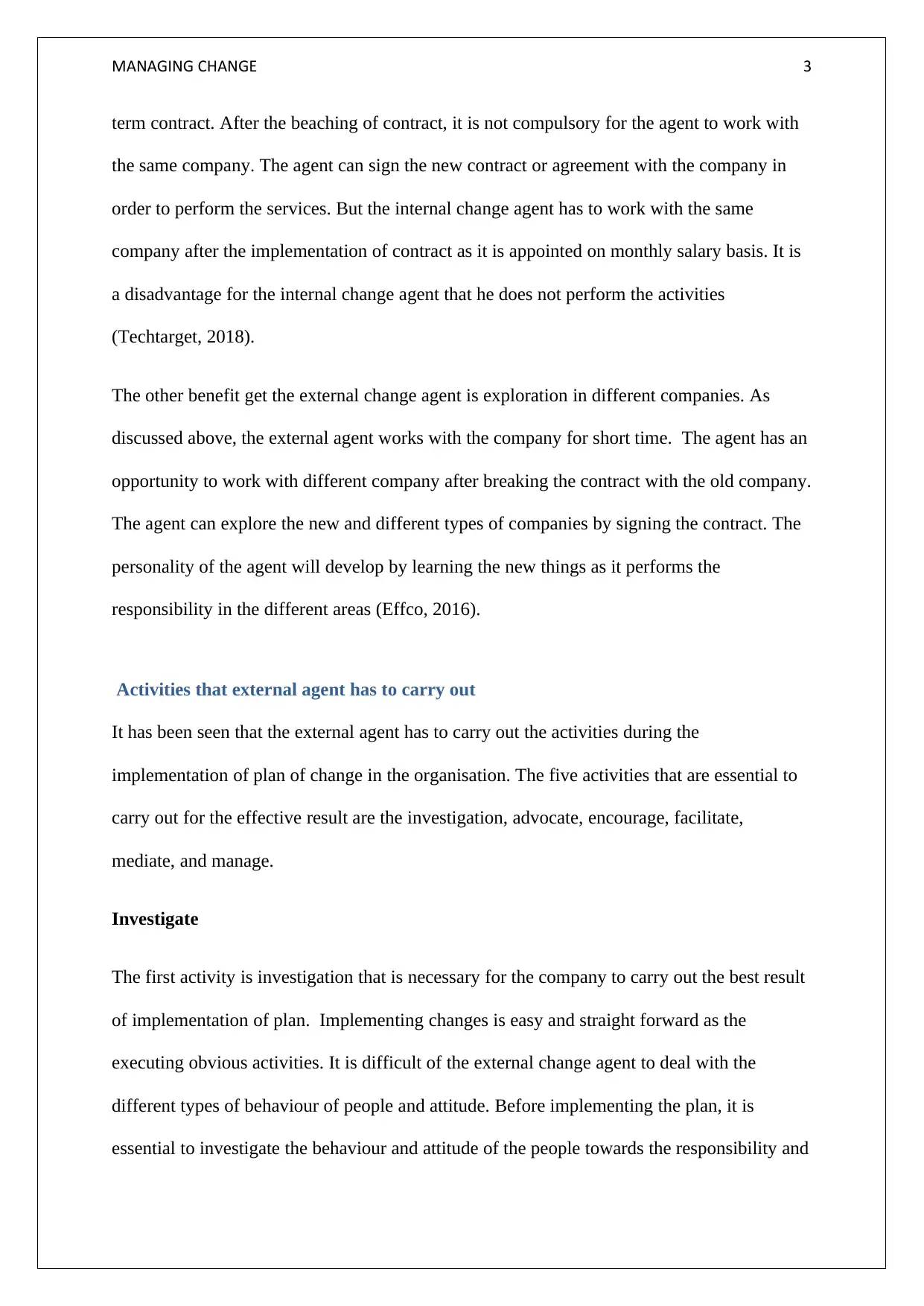
MANAGING CHANGE 3
term contract. After the beaching of contract, it is not compulsory for the agent to work with
the same company. The agent can sign the new contract or agreement with the company in
order to perform the services. But the internal change agent has to work with the same
company after the implementation of contract as it is appointed on monthly salary basis. It is
a disadvantage for the internal change agent that he does not perform the activities
(Techtarget, 2018).
The other benefit get the external change agent is exploration in different companies. As
discussed above, the external agent works with the company for short time. The agent has an
opportunity to work with different company after breaking the contract with the old company.
The agent can explore the new and different types of companies by signing the contract. The
personality of the agent will develop by learning the new things as it performs the
responsibility in the different areas (Effco, 2016).
Activities that external agent has to carry out
It has been seen that the external agent has to carry out the activities during the
implementation of plan of change in the organisation. The five activities that are essential to
carry out for the effective result are the investigation, advocate, encourage, facilitate,
mediate, and manage.
Investigate
The first activity is investigation that is necessary for the company to carry out the best result
of implementation of plan. Implementing changes is easy and straight forward as the
executing obvious activities. It is difficult of the external change agent to deal with the
different types of behaviour of people and attitude. Before implementing the plan, it is
essential to investigate the behaviour and attitude of the people towards the responsibility and
term contract. After the beaching of contract, it is not compulsory for the agent to work with
the same company. The agent can sign the new contract or agreement with the company in
order to perform the services. But the internal change agent has to work with the same
company after the implementation of contract as it is appointed on monthly salary basis. It is
a disadvantage for the internal change agent that he does not perform the activities
(Techtarget, 2018).
The other benefit get the external change agent is exploration in different companies. As
discussed above, the external agent works with the company for short time. The agent has an
opportunity to work with different company after breaking the contract with the old company.
The agent can explore the new and different types of companies by signing the contract. The
personality of the agent will develop by learning the new things as it performs the
responsibility in the different areas (Effco, 2016).
Activities that external agent has to carry out
It has been seen that the external agent has to carry out the activities during the
implementation of plan of change in the organisation. The five activities that are essential to
carry out for the effective result are the investigation, advocate, encourage, facilitate,
mediate, and manage.
Investigate
The first activity is investigation that is necessary for the company to carry out the best result
of implementation of plan. Implementing changes is easy and straight forward as the
executing obvious activities. It is difficult of the external change agent to deal with the
different types of behaviour of people and attitude. Before implementing the plan, it is
essential to investigate the behaviour and attitude of the people towards the responsibility and
Paraphrase This Document
Need a fresh take? Get an instant paraphrase of this document with our AI Paraphraser
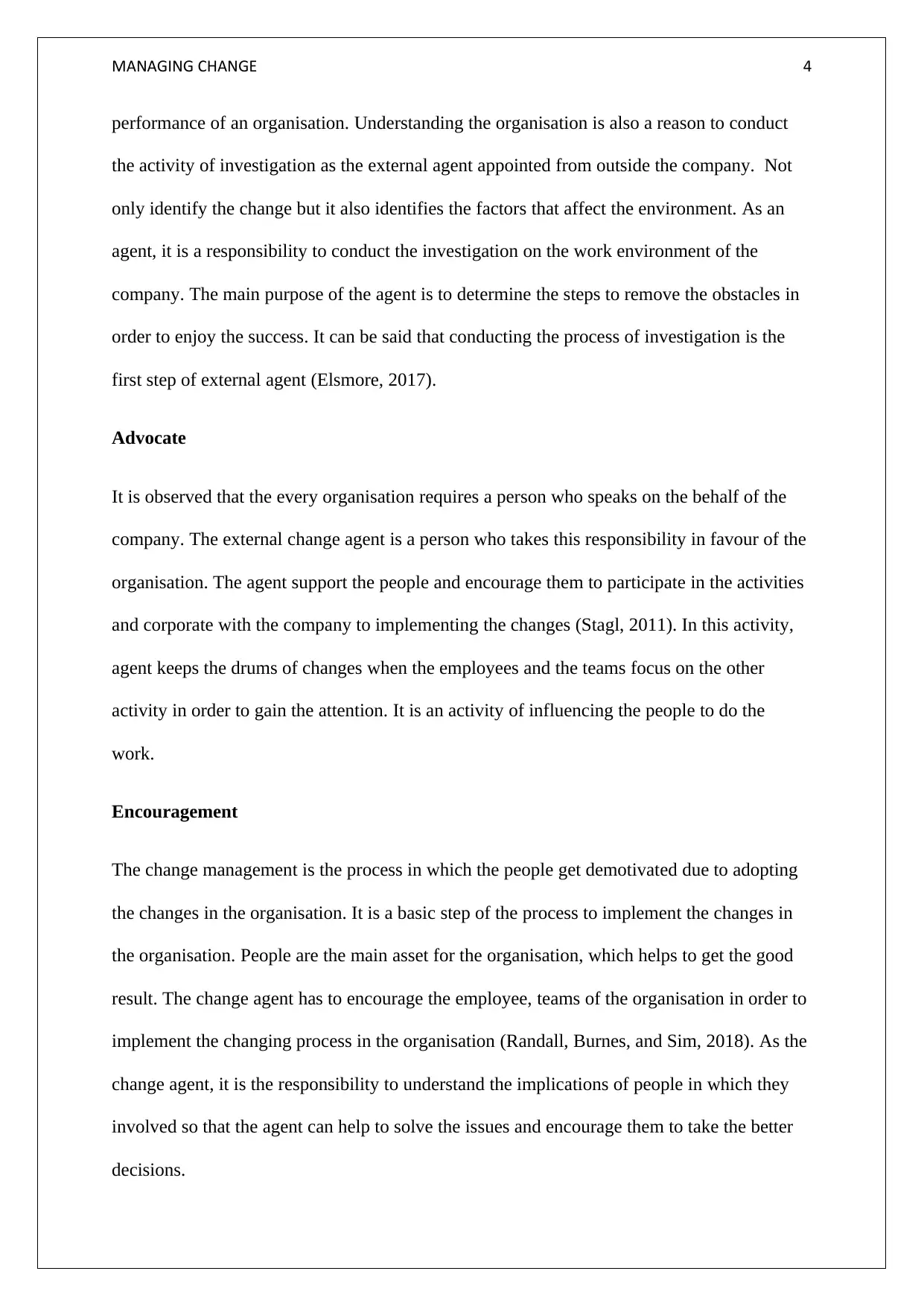
MANAGING CHANGE 4
performance of an organisation. Understanding the organisation is also a reason to conduct
the activity of investigation as the external agent appointed from outside the company. Not
only identify the change but it also identifies the factors that affect the environment. As an
agent, it is a responsibility to conduct the investigation on the work environment of the
company. The main purpose of the agent is to determine the steps to remove the obstacles in
order to enjoy the success. It can be said that conducting the process of investigation is the
first step of external agent (Elsmore, 2017).
Advocate
It is observed that the every organisation requires a person who speaks on the behalf of the
company. The external change agent is a person who takes this responsibility in favour of the
organisation. The agent support the people and encourage them to participate in the activities
and corporate with the company to implementing the changes (Stagl, 2011). In this activity,
agent keeps the drums of changes when the employees and the teams focus on the other
activity in order to gain the attention. It is an activity of influencing the people to do the
work.
Encouragement
The change management is the process in which the people get demotivated due to adopting
the changes in the organisation. It is a basic step of the process to implement the changes in
the organisation. People are the main asset for the organisation, which helps to get the good
result. The change agent has to encourage the employee, teams of the organisation in order to
implement the changing process in the organisation (Randall, Burnes, and Sim, 2018). As the
change agent, it is the responsibility to understand the implications of people in which they
involved so that the agent can help to solve the issues and encourage them to take the better
decisions.
performance of an organisation. Understanding the organisation is also a reason to conduct
the activity of investigation as the external agent appointed from outside the company. Not
only identify the change but it also identifies the factors that affect the environment. As an
agent, it is a responsibility to conduct the investigation on the work environment of the
company. The main purpose of the agent is to determine the steps to remove the obstacles in
order to enjoy the success. It can be said that conducting the process of investigation is the
first step of external agent (Elsmore, 2017).
Advocate
It is observed that the every organisation requires a person who speaks on the behalf of the
company. The external change agent is a person who takes this responsibility in favour of the
organisation. The agent support the people and encourage them to participate in the activities
and corporate with the company to implementing the changes (Stagl, 2011). In this activity,
agent keeps the drums of changes when the employees and the teams focus on the other
activity in order to gain the attention. It is an activity of influencing the people to do the
work.
Encouragement
The change management is the process in which the people get demotivated due to adopting
the changes in the organisation. It is a basic step of the process to implement the changes in
the organisation. People are the main asset for the organisation, which helps to get the good
result. The change agent has to encourage the employee, teams of the organisation in order to
implement the changing process in the organisation (Randall, Burnes, and Sim, 2018). As the
change agent, it is the responsibility to understand the implications of people in which they
involved so that the agent can help to solve the issues and encourage them to take the better
decisions.
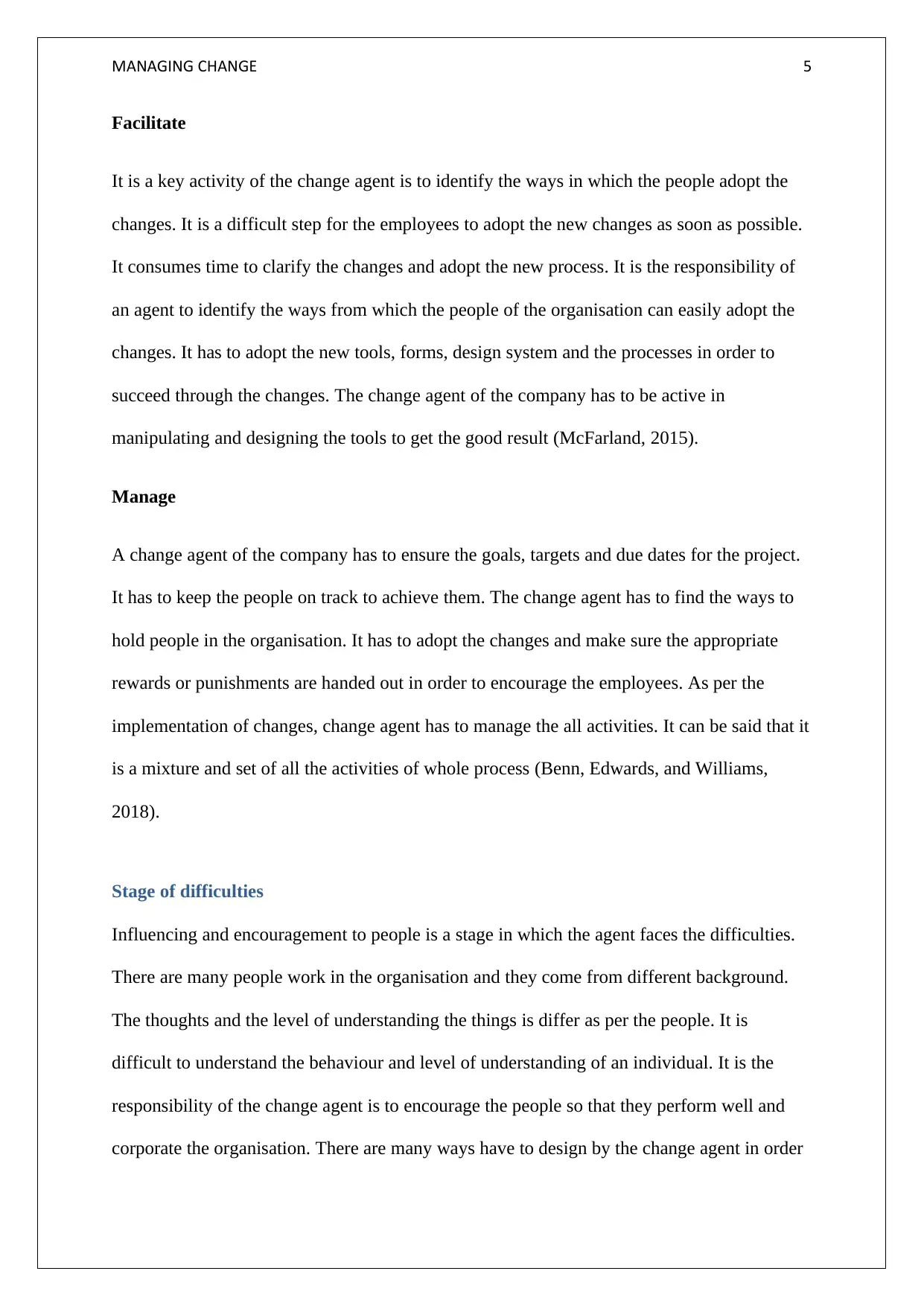
MANAGING CHANGE 5
Facilitate
It is a key activity of the change agent is to identify the ways in which the people adopt the
changes. It is a difficult step for the employees to adopt the new changes as soon as possible.
It consumes time to clarify the changes and adopt the new process. It is the responsibility of
an agent to identify the ways from which the people of the organisation can easily adopt the
changes. It has to adopt the new tools, forms, design system and the processes in order to
succeed through the changes. The change agent of the company has to be active in
manipulating and designing the tools to get the good result (McFarland, 2015).
Manage
A change agent of the company has to ensure the goals, targets and due dates for the project.
It has to keep the people on track to achieve them. The change agent has to find the ways to
hold people in the organisation. It has to adopt the changes and make sure the appropriate
rewards or punishments are handed out in order to encourage the employees. As per the
implementation of changes, change agent has to manage the all activities. It can be said that it
is a mixture and set of all the activities of whole process (Benn, Edwards, and Williams,
2018).
Stage of difficulties
Influencing and encouragement to people is a stage in which the agent faces the difficulties.
There are many people work in the organisation and they come from different background.
The thoughts and the level of understanding the things is differ as per the people. It is
difficult to understand the behaviour and level of understanding of an individual. It is the
responsibility of the change agent is to encourage the people so that they perform well and
corporate the organisation. There are many ways have to design by the change agent in order
Facilitate
It is a key activity of the change agent is to identify the ways in which the people adopt the
changes. It is a difficult step for the employees to adopt the new changes as soon as possible.
It consumes time to clarify the changes and adopt the new process. It is the responsibility of
an agent to identify the ways from which the people of the organisation can easily adopt the
changes. It has to adopt the new tools, forms, design system and the processes in order to
succeed through the changes. The change agent of the company has to be active in
manipulating and designing the tools to get the good result (McFarland, 2015).
Manage
A change agent of the company has to ensure the goals, targets and due dates for the project.
It has to keep the people on track to achieve them. The change agent has to find the ways to
hold people in the organisation. It has to adopt the changes and make sure the appropriate
rewards or punishments are handed out in order to encourage the employees. As per the
implementation of changes, change agent has to manage the all activities. It can be said that it
is a mixture and set of all the activities of whole process (Benn, Edwards, and Williams,
2018).
Stage of difficulties
Influencing and encouragement to people is a stage in which the agent faces the difficulties.
There are many people work in the organisation and they come from different background.
The thoughts and the level of understanding the things is differ as per the people. It is
difficult to understand the behaviour and level of understanding of an individual. It is the
responsibility of the change agent is to encourage the people so that they perform well and
corporate the organisation. There are many ways have to design by the change agent in order
⊘ This is a preview!⊘
Do you want full access?
Subscribe today to unlock all pages.

Trusted by 1+ million students worldwide
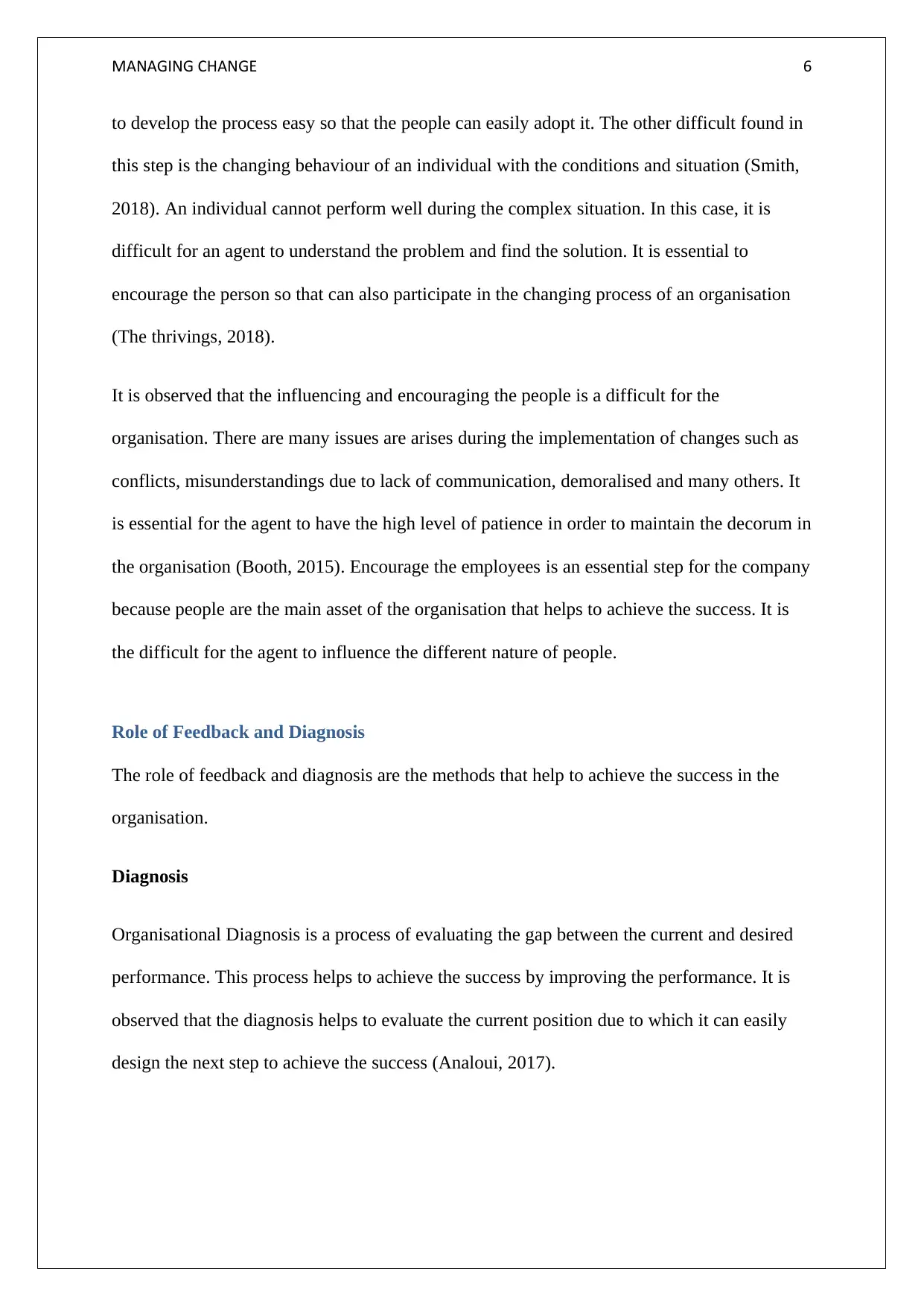
MANAGING CHANGE 6
to develop the process easy so that the people can easily adopt it. The other difficult found in
this step is the changing behaviour of an individual with the conditions and situation (Smith,
2018). An individual cannot perform well during the complex situation. In this case, it is
difficult for an agent to understand the problem and find the solution. It is essential to
encourage the person so that can also participate in the changing process of an organisation
(The thrivings, 2018).
It is observed that the influencing and encouraging the people is a difficult for the
organisation. There are many issues are arises during the implementation of changes such as
conflicts, misunderstandings due to lack of communication, demoralised and many others. It
is essential for the agent to have the high level of patience in order to maintain the decorum in
the organisation (Booth, 2015). Encourage the employees is an essential step for the company
because people are the main asset of the organisation that helps to achieve the success. It is
the difficult for the agent to influence the different nature of people.
Role of Feedback and Diagnosis
The role of feedback and diagnosis are the methods that help to achieve the success in the
organisation.
Diagnosis
Organisational Diagnosis is a process of evaluating the gap between the current and desired
performance. This process helps to achieve the success by improving the performance. It is
observed that the diagnosis helps to evaluate the current position due to which it can easily
design the next step to achieve the success (Analoui, 2017).
to develop the process easy so that the people can easily adopt it. The other difficult found in
this step is the changing behaviour of an individual with the conditions and situation (Smith,
2018). An individual cannot perform well during the complex situation. In this case, it is
difficult for an agent to understand the problem and find the solution. It is essential to
encourage the person so that can also participate in the changing process of an organisation
(The thrivings, 2018).
It is observed that the influencing and encouraging the people is a difficult for the
organisation. There are many issues are arises during the implementation of changes such as
conflicts, misunderstandings due to lack of communication, demoralised and many others. It
is essential for the agent to have the high level of patience in order to maintain the decorum in
the organisation (Booth, 2015). Encourage the employees is an essential step for the company
because people are the main asset of the organisation that helps to achieve the success. It is
the difficult for the agent to influence the different nature of people.
Role of Feedback and Diagnosis
The role of feedback and diagnosis are the methods that help to achieve the success in the
organisation.
Diagnosis
Organisational Diagnosis is a process of evaluating the gap between the current and desired
performance. This process helps to achieve the success by improving the performance. It is
observed that the diagnosis helps to evaluate the current position due to which it can easily
design the next step to achieve the success (Analoui, 2017).
Paraphrase This Document
Need a fresh take? Get an instant paraphrase of this document with our AI Paraphraser
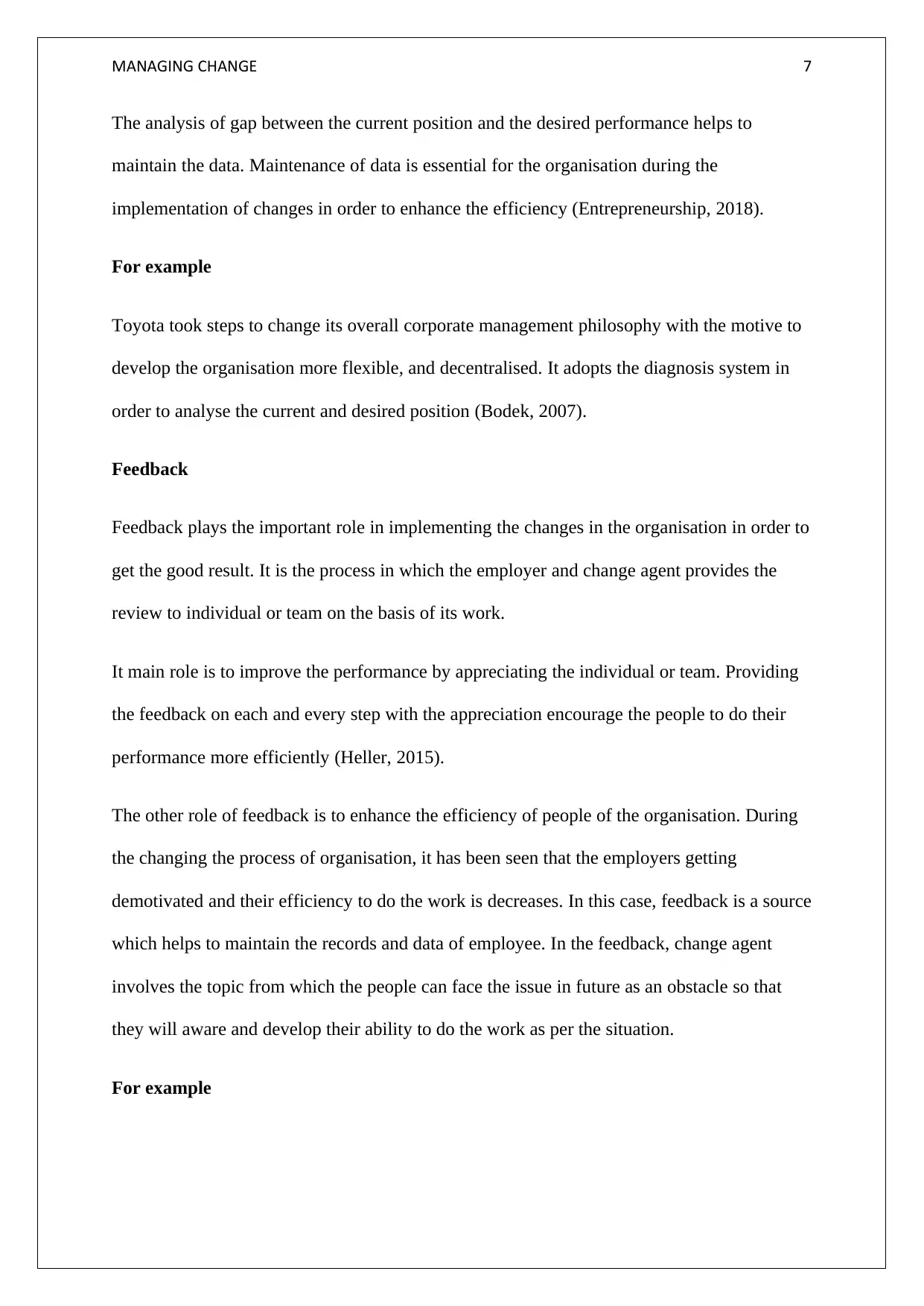
MANAGING CHANGE 7
The analysis of gap between the current position and the desired performance helps to
maintain the data. Maintenance of data is essential for the organisation during the
implementation of changes in order to enhance the efficiency (Entrepreneurship, 2018).
For example
Toyota took steps to change its overall corporate management philosophy with the motive to
develop the organisation more flexible, and decentralised. It adopts the diagnosis system in
order to analyse the current and desired position (Bodek, 2007).
Feedback
Feedback plays the important role in implementing the changes in the organisation in order to
get the good result. It is the process in which the employer and change agent provides the
review to individual or team on the basis of its work.
It main role is to improve the performance by appreciating the individual or team. Providing
the feedback on each and every step with the appreciation encourage the people to do their
performance more efficiently (Heller, 2015).
The other role of feedback is to enhance the efficiency of people of the organisation. During
the changing the process of organisation, it has been seen that the employers getting
demotivated and their efficiency to do the work is decreases. In this case, feedback is a source
which helps to maintain the records and data of employee. In the feedback, change agent
involves the topic from which the people can face the issue in future as an obstacle so that
they will aware and develop their ability to do the work as per the situation.
For example
The analysis of gap between the current position and the desired performance helps to
maintain the data. Maintenance of data is essential for the organisation during the
implementation of changes in order to enhance the efficiency (Entrepreneurship, 2018).
For example
Toyota took steps to change its overall corporate management philosophy with the motive to
develop the organisation more flexible, and decentralised. It adopts the diagnosis system in
order to analyse the current and desired position (Bodek, 2007).
Feedback
Feedback plays the important role in implementing the changes in the organisation in order to
get the good result. It is the process in which the employer and change agent provides the
review to individual or team on the basis of its work.
It main role is to improve the performance by appreciating the individual or team. Providing
the feedback on each and every step with the appreciation encourage the people to do their
performance more efficiently (Heller, 2015).
The other role of feedback is to enhance the efficiency of people of the organisation. During
the changing the process of organisation, it has been seen that the employers getting
demotivated and their efficiency to do the work is decreases. In this case, feedback is a source
which helps to maintain the records and data of employee. In the feedback, change agent
involves the topic from which the people can face the issue in future as an obstacle so that
they will aware and develop their ability to do the work as per the situation.
For example
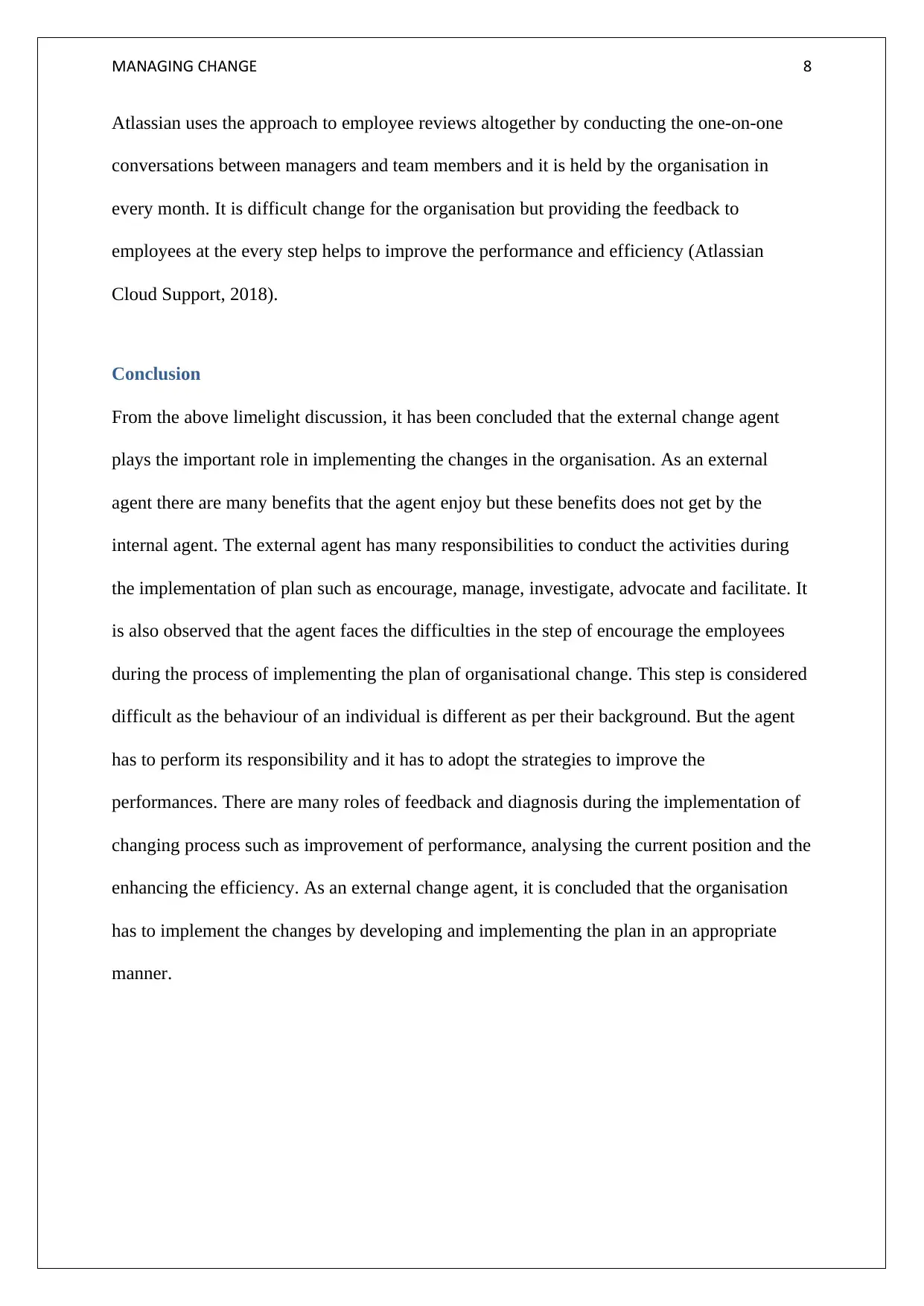
MANAGING CHANGE 8
Atlassian uses the approach to employee reviews altogether by conducting the one-on-one
conversations between managers and team members and it is held by the organisation in
every month. It is difficult change for the organisation but providing the feedback to
employees at the every step helps to improve the performance and efficiency (Atlassian
Cloud Support, 2018).
Conclusion
From the above limelight discussion, it has been concluded that the external change agent
plays the important role in implementing the changes in the organisation. As an external
agent there are many benefits that the agent enjoy but these benefits does not get by the
internal agent. The external agent has many responsibilities to conduct the activities during
the implementation of plan such as encourage, manage, investigate, advocate and facilitate. It
is also observed that the agent faces the difficulties in the step of encourage the employees
during the process of implementing the plan of organisational change. This step is considered
difficult as the behaviour of an individual is different as per their background. But the agent
has to perform its responsibility and it has to adopt the strategies to improve the
performances. There are many roles of feedback and diagnosis during the implementation of
changing process such as improvement of performance, analysing the current position and the
enhancing the efficiency. As an external change agent, it is concluded that the organisation
has to implement the changes by developing and implementing the plan in an appropriate
manner.
Atlassian uses the approach to employee reviews altogether by conducting the one-on-one
conversations between managers and team members and it is held by the organisation in
every month. It is difficult change for the organisation but providing the feedback to
employees at the every step helps to improve the performance and efficiency (Atlassian
Cloud Support, 2018).
Conclusion
From the above limelight discussion, it has been concluded that the external change agent
plays the important role in implementing the changes in the organisation. As an external
agent there are many benefits that the agent enjoy but these benefits does not get by the
internal agent. The external agent has many responsibilities to conduct the activities during
the implementation of plan such as encourage, manage, investigate, advocate and facilitate. It
is also observed that the agent faces the difficulties in the step of encourage the employees
during the process of implementing the plan of organisational change. This step is considered
difficult as the behaviour of an individual is different as per their background. But the agent
has to perform its responsibility and it has to adopt the strategies to improve the
performances. There are many roles of feedback and diagnosis during the implementation of
changing process such as improvement of performance, analysing the current position and the
enhancing the efficiency. As an external change agent, it is concluded that the organisation
has to implement the changes by developing and implementing the plan in an appropriate
manner.
⊘ This is a preview!⊘
Do you want full access?
Subscribe today to unlock all pages.

Trusted by 1+ million students worldwide
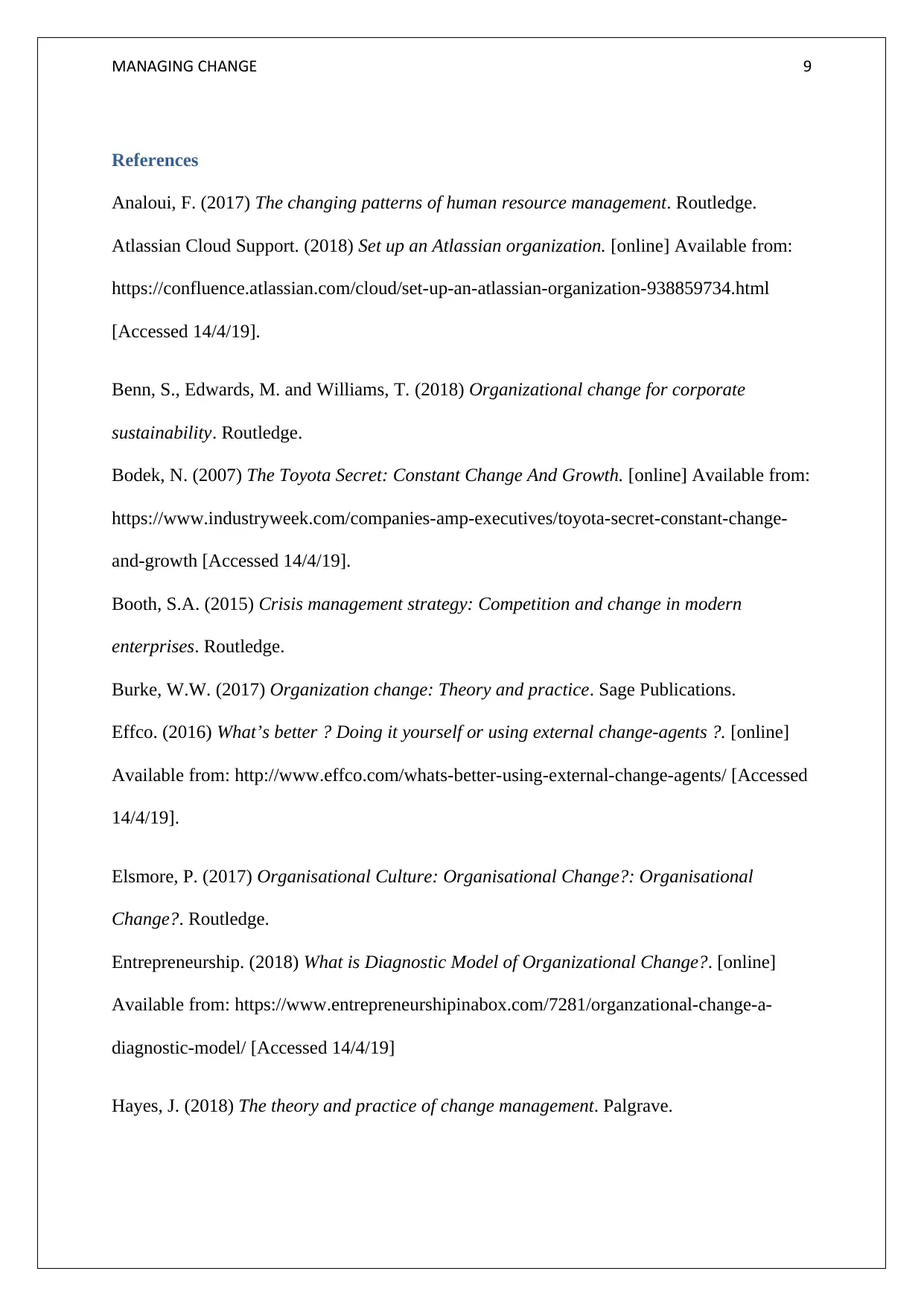
MANAGING CHANGE 9
References
Analoui, F. (2017) The changing patterns of human resource management. Routledge.
Atlassian Cloud Support. (2018) Set up an Atlassian organization. [online] Available from:
https://confluence.atlassian.com/cloud/set-up-an-atlassian-organization-938859734.html
[Accessed 14/4/19].
Benn, S., Edwards, M. and Williams, T. (2018) Organizational change for corporate
sustainability. Routledge.
Bodek, N. (2007) The Toyota Secret: Constant Change And Growth. [online] Available from:
https://www.industryweek.com/companies-amp-executives/toyota-secret-constant-change-
and-growth [Accessed 14/4/19].
Booth, S.A. (2015) Crisis management strategy: Competition and change in modern
enterprises. Routledge.
Burke, W.W. (2017) Organization change: Theory and practice. Sage Publications.
Effco. (2016) What’s better ? Doing it yourself or using external change-agents ?. [online]
Available from: http://www.effco.com/whats-better-using-external-change-agents/ [Accessed
14/4/19].
Elsmore, P. (2017) Organisational Culture: Organisational Change?: Organisational
Change?. Routledge.
Entrepreneurship. (2018) What is Diagnostic Model of Organizational Change?. [online]
Available from: https://www.entrepreneurshipinabox.com/7281/organzational-change-a-
diagnostic-model/ [Accessed 14/4/19]
Hayes, J. (2018) The theory and practice of change management. Palgrave.
References
Analoui, F. (2017) The changing patterns of human resource management. Routledge.
Atlassian Cloud Support. (2018) Set up an Atlassian organization. [online] Available from:
https://confluence.atlassian.com/cloud/set-up-an-atlassian-organization-938859734.html
[Accessed 14/4/19].
Benn, S., Edwards, M. and Williams, T. (2018) Organizational change for corporate
sustainability. Routledge.
Bodek, N. (2007) The Toyota Secret: Constant Change And Growth. [online] Available from:
https://www.industryweek.com/companies-amp-executives/toyota-secret-constant-change-
and-growth [Accessed 14/4/19].
Booth, S.A. (2015) Crisis management strategy: Competition and change in modern
enterprises. Routledge.
Burke, W.W. (2017) Organization change: Theory and practice. Sage Publications.
Effco. (2016) What’s better ? Doing it yourself or using external change-agents ?. [online]
Available from: http://www.effco.com/whats-better-using-external-change-agents/ [Accessed
14/4/19].
Elsmore, P. (2017) Organisational Culture: Organisational Change?: Organisational
Change?. Routledge.
Entrepreneurship. (2018) What is Diagnostic Model of Organizational Change?. [online]
Available from: https://www.entrepreneurshipinabox.com/7281/organzational-change-a-
diagnostic-model/ [Accessed 14/4/19]
Hayes, J. (2018) The theory and practice of change management. Palgrave.
Paraphrase This Document
Need a fresh take? Get an instant paraphrase of this document with our AI Paraphraser
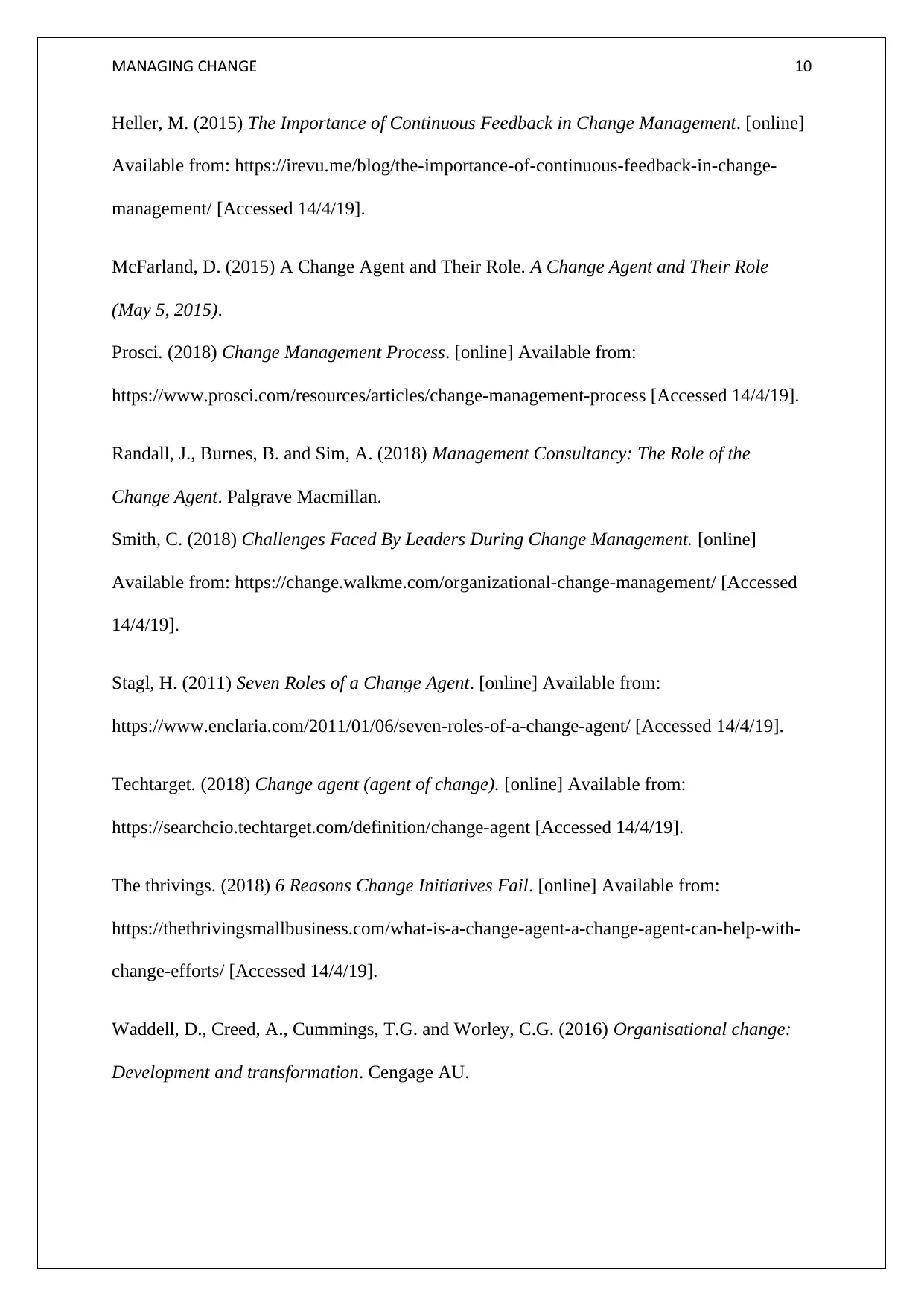
MANAGING CHANGE 10
Heller, M. (2015) The Importance of Continuous Feedback in Change Management. [online]
Available from: https://irevu.me/blog/the-importance-of-continuous-feedback-in-change-
management/ [Accessed 14/4/19].
McFarland, D. (2015) A Change Agent and Their Role. A Change Agent and Their Role
(May 5, 2015).
Prosci. (2018) Change Management Process. [online] Available from:
https://www.prosci.com/resources/articles/change-management-process [Accessed 14/4/19].
Randall, J., Burnes, B. and Sim, A. (2018) Management Consultancy: The Role of the
Change Agent. Palgrave Macmillan.
Smith, C. (2018) Challenges Faced By Leaders During Change Management. [online]
Available from: https://change.walkme.com/organizational-change-management/ [Accessed
14/4/19].
Stagl, H. (2011) Seven Roles of a Change Agent. [online] Available from:
https://www.enclaria.com/2011/01/06/seven-roles-of-a-change-agent/ [Accessed 14/4/19].
Techtarget. (2018) Change agent (agent of change). [online] Available from:
https://searchcio.techtarget.com/definition/change-agent [Accessed 14/4/19].
The thrivings. (2018) 6 Reasons Change Initiatives Fail. [online] Available from:
https://thethrivingsmallbusiness.com/what-is-a-change-agent-a-change-agent-can-help-with-
change-efforts/ [Accessed 14/4/19].
Waddell, D., Creed, A., Cummings, T.G. and Worley, C.G. (2016) Organisational change:
Development and transformation. Cengage AU.
Heller, M. (2015) The Importance of Continuous Feedback in Change Management. [online]
Available from: https://irevu.me/blog/the-importance-of-continuous-feedback-in-change-
management/ [Accessed 14/4/19].
McFarland, D. (2015) A Change Agent and Their Role. A Change Agent and Their Role
(May 5, 2015).
Prosci. (2018) Change Management Process. [online] Available from:
https://www.prosci.com/resources/articles/change-management-process [Accessed 14/4/19].
Randall, J., Burnes, B. and Sim, A. (2018) Management Consultancy: The Role of the
Change Agent. Palgrave Macmillan.
Smith, C. (2018) Challenges Faced By Leaders During Change Management. [online]
Available from: https://change.walkme.com/organizational-change-management/ [Accessed
14/4/19].
Stagl, H. (2011) Seven Roles of a Change Agent. [online] Available from:
https://www.enclaria.com/2011/01/06/seven-roles-of-a-change-agent/ [Accessed 14/4/19].
Techtarget. (2018) Change agent (agent of change). [online] Available from:
https://searchcio.techtarget.com/definition/change-agent [Accessed 14/4/19].
The thrivings. (2018) 6 Reasons Change Initiatives Fail. [online] Available from:
https://thethrivingsmallbusiness.com/what-is-a-change-agent-a-change-agent-can-help-with-
change-efforts/ [Accessed 14/4/19].
Waddell, D., Creed, A., Cummings, T.G. and Worley, C.G. (2016) Organisational change:
Development and transformation. Cengage AU.
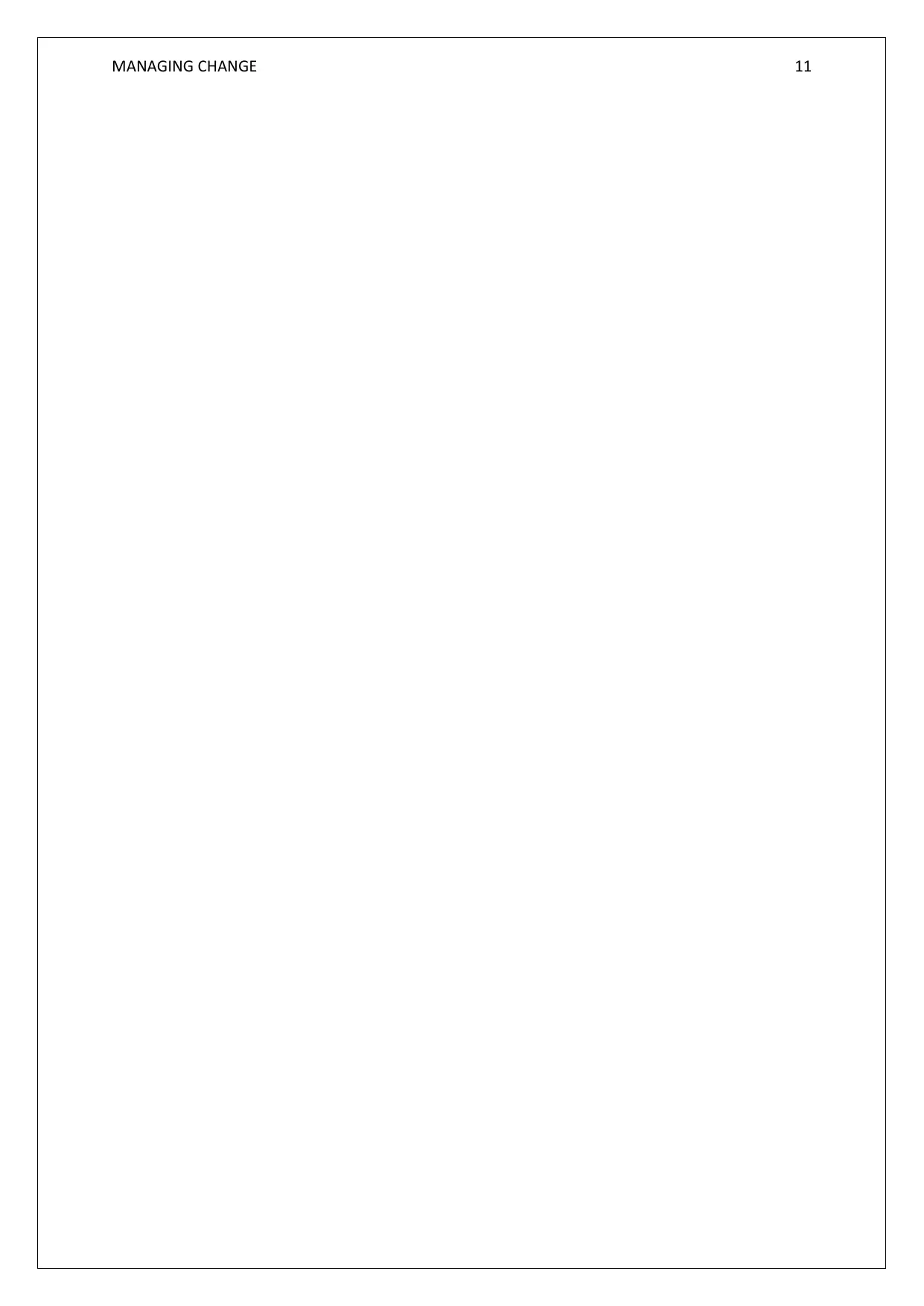
MANAGING CHANGE 11
⊘ This is a preview!⊘
Do you want full access?
Subscribe today to unlock all pages.

Trusted by 1+ million students worldwide
1 out of 12
Related Documents
Your All-in-One AI-Powered Toolkit for Academic Success.
+13062052269
info@desklib.com
Available 24*7 on WhatsApp / Email
![[object Object]](/_next/static/media/star-bottom.7253800d.svg)
Unlock your academic potential
Copyright © 2020–2026 A2Z Services. All Rights Reserved. Developed and managed by ZUCOL.





